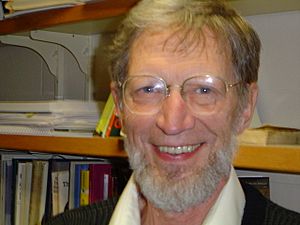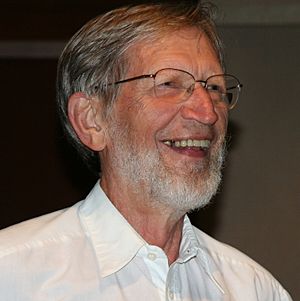Alvin Plantinga facts for kids
Quick facts for kids
Alvin Plantinga
|
|
|---|---|

Plantinga in 2004
|
|
| Born |
Alvin Carl Plantinga
November 15, 1932 Ann Arbor, Michigan, U.S.
|
| Education |
|
|
Notable work
|
|
| Spouse(s) |
Kathleen De Boer
(m. 1955) |
| Awards |
|
| Era | 20th-century philosophy |
| Region | Western philosophy |
| School | Analytic |
| Institutions |
|
| Doctoral advisor | Paul Weiss |
|
Main interests
|
|
|
Notable ideas
|
|
Alvin Carl Plantinga (born November 15, 1932) is an American philosopher and theologian. He is known for his work in the philosophy of religion, which explores ideas about God and faith. He also studies epistemology, which is the study of knowledge and how we know things, and logic, which is about correct reasoning.
Plantinga taught at Calvin University and the University of Notre Dame. He is a well-known Christian philosopher. Time magazine once called him "America's leading orthodox Protestant philosopher of God." In 2017, he received the Templeton Prize, a major award for people who explore life's deepest questions.
Some of his important books include God and Other Minds (1967) and Warranted Christian Belief (2000).
About Alvin Plantinga
His Family and Early Life
Alvin Plantinga was born on November 15, 1932, in Ann Arbor, Michigan. His parents, Cornelius and Lettie, came from the Netherlands. His father was also a philosopher and taught at different schools.
In 1955, Plantinga married Kathleen De Boer, and they had four children. His brothers, Cornelius Jr. and Leon, also became successful in their fields. Cornelius Jr. is a theologian, and Leon is a music professor.
His Education Journey
When Alvin was a teenager, his family moved to North Dakota. He was very smart and skipped his last year of high school. At 16, he started college at Jamestown College in 1949.
Later, he moved with his family to Grand Rapids and attended Calvin University. He then got a scholarship to Harvard University but decided to return to Calvin University to study philosophy. He was very impressed by his professor, William Harry Jellema. Plantinga continued his studies at the University of Michigan and earned his PhD from Yale University in 1958.
His Teaching Career
Plantinga started teaching philosophy at Yale in 1957. He then taught at Wayne State University before returning to Calvin University in 1963. He taught there for 19 years.
In 1982, he moved to the University of Notre Dame. He retired from Notre Dame in 2010 but went back to Calvin University. There, he holds a special teaching position named after his former professor, William Harry Jellema. He has taught and influenced many other philosophers.
Awards and Special Recognitions
Plantinga has received many honors for his work. He was president of the American Philosophical Association and the Society of Christian Philosophers.
He has also received honorary degrees from several universities around the world. In 1975, he was chosen as a Fellow of the American Academy of Arts and Sciences.
In 2012, he received the Nicholas Rescher Prize for Systematic Philosophy. He gave a talk called "Religion and Science: Where the Conflict Really Lies." In 2017, he was awarded the prestigious Templeton Prize.
Plantinga's Main Ideas
Plantinga has some important ideas about God and belief. He argues that some people can know that God exists as a basic belief, meaning they don't need arguments or evidence to believe it.
He also argues that the existence of evil in the world does not mean that an all-powerful, all-knowing, and good God cannot exist.
The Problem of Evil
One of Plantinga's famous ideas is called the "free-will defense." This idea tries to answer the question: If God is good and all-powerful, why is there evil in the world?
Plantinga suggests that God, even though all-powerful, might not be able to create a world with free people who never choose to do evil. He also says that God, being all-good, might want to create a world that has evil if it means people can have true moral goodness through their own free choices. In other words, for people to be truly good, they must have the freedom to choose between good and evil. If they always had to choose good, they wouldn't truly be free.
Plantinga explains that the price for creating a world where people can do good is also creating one where they can do evil.
Belief in God as a Basic Idea
Plantinga's idea of "Reformed epistemology" suggests that believing in God can be reasonable and right, even without needing proof or arguments. He says that belief in God can be a "properly basic" belief. This means it can be a starting point for knowledge, much like how we believe our senses (like seeing or hearing) without needing to prove they are working.
He explains this idea in a series of books. He argues that for a belief to be true and reliable, our minds must be working correctly, like a well-designed machine. He suggests that if God designed our minds, then our ability to believe in God could be part of that design, making it a reliable and warranted belief.
The Argument from Evolution Against Naturalism
Plantinga also has an interesting argument about evolution and naturalism. Naturalism is the idea that only natural things exist, and there is no supernatural.
Plantinga argues that if both evolution and naturalism are true, then our minds evolved to help us survive, not necessarily to help us find the truth. For example, if believing a tiger is a friendly cat makes you run away (because you think running is the best way to pet it), that belief helps you survive, even if it's not true.
He suggests that if our minds are only designed for survival, we might not be able to trust that our beliefs are actually true. This would include our belief in naturalism and evolution itself! However, if God created humans, even through evolution, then our minds would likely be designed to find truth, making our beliefs more reliable.
His View on Science and Religion
Plantinga believes that there is no real conflict between religion and science. He thinks they can work together. He says that science doesn't cover everything we know. For example, science assumes there was a past, but it doesn't prove it.
He has supported the Intelligent Design Movement, which suggests that some features of the universe and living things are best explained by an intelligent cause, not just random chance. However, Plantinga clarifies that he doesn't think science can prove intelligent design.
He believes that God could have used evolution to create the world. He says that the scientific theory of evolution itself doesn't say whether God guided it or not. Plantinga rejects the idea of unguided evolution, meaning evolution that happens without any divine direction. He argues that the real conflict is not between science and religion, but between science and naturalism (the idea that there is no God).
Books by Alvin Plantinga
- God and Other Minds (1967)
- The Nature of Necessity (1974)
- God, Freedom, and Evil (1974)
- Warrant: The Current Debate (1993)
- Warrant and Proper Function (1993)
- Warranted Christian Belief (2000)
- Where the Conflict Really Lies: Science, Religion, and Naturalism (2011)
- Knowledge and Christian Belief (2015)
See also
 In Spanish: Alvin Plantinga para niños
In Spanish: Alvin Plantinga para niños
 | Dorothy Vaughan |
 | Charles Henry Turner |
 | Hildrus Poindexter |
 | Henry Cecil McBay |


